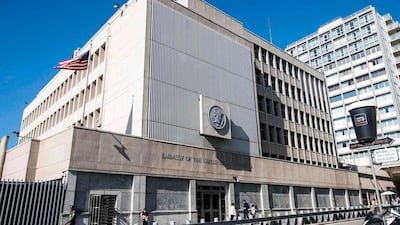Israel has waived normally issued construction permits to ensure that temporary premises for a US embassy in Jerusalem will be opened in May.
The decision disregarded normal procedures and will add to Palestinian fury and international concern over the diplomatic relocation from Tel Aviv.
Finance Minister Moshe Kahlon announced the move.
"We will not allow needless bureaucracy to hold up the transfer of the American embassy to Jerusalem, Israel's eternal capital," he said in a statement.
"This is a strategic diplomatic move for the state of Israel and the planning agencies under me will do whatever is necessary to accommodate the schedule being demanded."
The planning permit waiver for the embassy will last for three years, the ministry statement said.
US President Donald Trump in December shocked the world by recognising Jerusalem as Israel's capital and announcing that America's embassy would be moved there.
The relocation was welcomed by Israel, with Prime Minister Benjamin Netanyahu calling it a "historic decision", but it drew much criticism from the international community and angered Palestinians, who regard Jerusalem as the capital of their own future state.
_______________
Israel's Jews and Arab minority further apart than ever, poll says
Israel says more states eyeing Jerusalem embassy move
_______________
Israel has said the embassy will be opened on May 14, the 70th anniversary of the country's founding and the fleeing and expulsion of more than 700,000 Palestinians.
A US official said it would be located at a provisional site in Jerusalem that now houses a US consular section.
Building a permanent embassy could take several years.
Jerusalem Mayor Nir Barkat had voiced concern about the timeline, telling Israel Radio on March 9: "I hope their (Americans') schedule will be kept."
The interim embassy will be based in the Jerusalem neighbourhood of Arnona and will contain office space for the ambassador and a small staff, said the US embassy in Tel Aviv.
"By the end of next year, we intend to open a new embassy Jerusalem annex on the Arnona compound that will provide the Ambassador and his team with expanded interim office space," said a US official at the embassy, adding that a search for the construction site of a permanent embassy had begun.
Most countries do not recognise either side's sovereignty in Jerusalem and have embassies to Israel in the Tel Aviv area.
Mr Netanyahu has described Jerusalem as "the capital of the Jewish people for 3,000 years", and President Trump said the embassy move was "a long overdue step to advance the peace process".
In early March Israeli officials said they were on the cusp of persuading more countries to move their embassies to Jerusalem.
Palestinian leaders said Washington's decision meant it was no longer an honest broker in efforts to revive peace talks, which collapsed in 2014.
And last week the Palestinian president Mahmoud Abbas called the US ambassador to Israel a "son of a dog" in an angry rant against the Trump administration, signalling new trouble ahead for an expected US peace proposal.
In his speech, Mr Abbas criticised the US recognition of Jerusalem as Israel's capital, the American plan to move its embassy to the city and the cut-off of hundreds of millions of dollars in aid to the UN agency for Palestinian refugees.
In March a poll carried out by Haifa University sociologist Sammy Smooha has found that relations between Jewish Israelis and citizens of the Arab minority are plummeting, with each side losing faith in coexistence and becoming less tolerant of the other.

